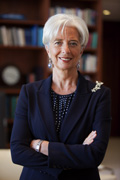Christine Lagarde, Managing Director of the IMF, at the Davos World Economic Forum
A New Global Economy for a New Generation

I know we are all still deeply concerned with the state of the global economy. Where do we stand? Well, thanks to policy actions taken over the past year, we have seen some respite and some stabilization in financial conditions.
But it is not all good news. The recovery is still weak, and uncertainty is still high. As the IMF announced just a few hours ago in our
World Economic Outlook, we expect global growth of only 3½ percent this year, not much higher than last year. The short-term pressures might have alleviated,
but the longer-term pressures are still with us.
As I have said recently and it bears repeating: we have avoided collapse, but we need to guard against any relapse. 2013 will be a make-or-break year.
We all know the imperative—keep up the momentum on the policy actions needed to put uncertainty to rest.
What does that mean? For the Euro Area, it means making firewalls operational; pushing ahead with banking union; continuing with the difficult but necessary fiscal adjustment at the country level; and supporting demand, especially with further monetary easing.
For the United States, it means pulling together in the national interest and avoiding further avoidable policy mistakes, such as failing to agree on increasing the debt ceiling—and, for the United States and Japan, reaching agreement on medium-term debt reduction.
For the emerging and developing economies, faring better despite their concerns about continued turmoil and lack of decisive action in the advanced economies, conditions differ greatly. Some are more vulnerable than others, but they need to rebuild the policy space that has been used up in alleviating the crisis in recent times.
So these are the short-term priorities as I see them.
a world of challenges, yes, but it is also a world of “resilient dynamism”.
Second, a reallocation of political and economic power across the world. By 2025, for example, two-thirds of the world’s population will live in Asia. This can lead to greater cooperation or to greater tension and competition.
Third, a seismic shift in demographics, as the “youth bulge” in various emerging regions rubs up against the “graying” populations elsewhere. Sixty percent of the population in the Middle East and North Africa is under 30. It is 70 percent for sub-Saharan Africa. Again, either a great opportunity or a source of instability.
Fourth, increasing vulnerability from resource scarcity and climate change, with the potential for major social and economic disruption. This is the real wild card in the pack.
So how can we successfully navigate our way into this future world? There are no easy answers. So where to begin? I think it starts with the new generation on the march—in a world that is flatter, more closely-knit, more interconnected than ever before in history.
Download the website sponsorship guide


